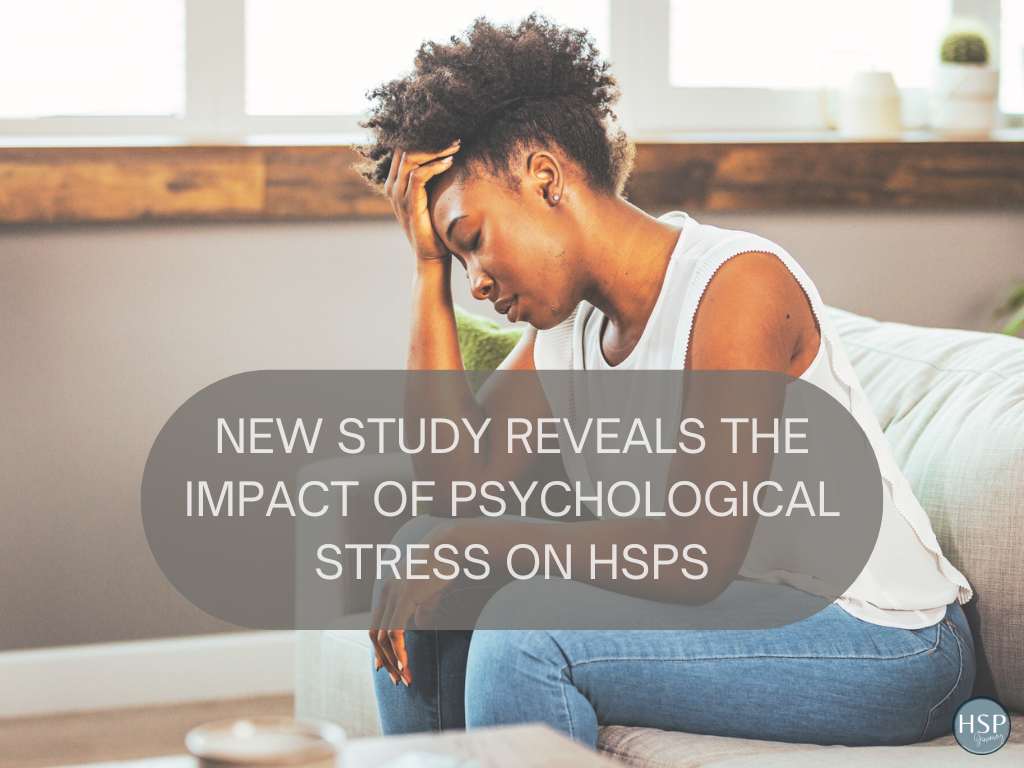Recent studies in health psychology suggest a potential link between sensory processing sensitivity (SPS) and and the impact of psychological stress. SPS is the clinical name for the highly sensitive person (HSP) trait, as researched by Dr. Elaine Aron. This interesting study conducted by Jordan Buren and Dr. Grant Benham was reported by Sensitivity Research, one of the only research institutions devoted to the HSP trait. For those who consider themselves HSPs, understanding ourselves more deeply, having a better grasp on our psychological make up can assist in building fulfilling and sustainable lives.

Table of Contents
Investigative Highlights:
- Sensory Processing Sensitivity: Explores potential impact on health.
- Stress Perception: Considered as a key biobehavioral mechanism.
- Health Correlation: Examines the stress-health dynamic in relation to personality traits like SPS.
These explorations consider the role of perceived stress as a significant influencer on one’s physical health, potentially mediating the effects of SPS on the body.
The Research Methodology of Psychological Stress on HSPs
In the investigation, a significant cohort of 923 undergraduate students participated. They completed various standardized instruments through an online medium. The tools they engaged with include:
- The 27-item Sensitive Personality Gauge, to determine stress sensitivity.
- The Perceived Stress Scale, a recognized index of stress levels.
- Two instruments for recording self-perceived health status: the Cohen-Hoberman Index of Physical Symptoms and the Physical Health Questionnaire.
To rule out the potential impact of negative emotional states on the study’s findings, the researchers incorporated a negative affect scale. They derived this scale from the International Positive and Negative Affect Schedule—Short Form. They also adjusted their analyses to account for this variable.
The demographic composition was predominantly female, with a significant majority identifying as Hispanic (93%). Participants ranged from young adults to those in the 50-year age bracket, with the average age being around 20.6 years. To further the investigation into the psychophysiological domain, tasks such as the Stroop Task were used. This task provides a cognitive challenge that can offer insights into attention processes and mental agility. Conversations on gene expression in connection to the collected survey data remain beyond the scope of this research phase.
Looking for HSP Tools to Thrive in a Chaotic World?
The modern world is often overwhelming and stressful for those of us with sensitive nervous systems. Many of us have suffered from the challenges of high stress, anxiety, sensory overload, and mental health and physical health issues. Fortunately, after years of working with and researching Highly Sensitive People (HSPs), Julie Bjelland has developed many tools that have not only helped her but thousands of HSPs all over the world move out of survival mode living and into thriving. In this free webinar, she’ll share the tools that HSPs have found the most life-changing. Her goal is to help you live to your fullest potential because the world needs you.
Join this free webinar and get tools to help you thrive as an HSP!
Health Implications of Sensory Processing Sensitivity
Recent studies connect Sensory Processing Sensitivity (SPS) with general health status. They suggest that individuals with higher SPS scores may experience more challenges in maintaining optimal physical health. This relationship appears to be influenced by the structure of SPS, which is composed of three distinct components: Ease of Excitation (EOE), Aesthetic Sensitivity (AES), and Low Sensory Threshold (LST).
- EOE: relates to the tendency to become easily overwhelmed by external stimuli.
- AES: involves an appreciation for sensory and aesthetic experiences.
- LST: denotes a heightened awareness of subtle stimuli.
Analyses implicate EOE and LST as more significant indicators of health difficulties, including the risk of chronic diseases and their progression, than AES. These components of SPS might affect various health behaviors and amplify inflammation. This could potentially influence the incidence of physical illness over time.
Notably, individuals with high sensitivity may encounter an increased rate of hospitalization, adding to the complexity of the SPS-health dynamic. Understanding and identifying these associations can aid in tailoring health strategies that cater to the unique needs of highly sensitive persons (HSPs). This might bolster their vitality and reduce mortality risks as they age.
Stress as a Link in Health Outcomes – Psychological Stress on HSPs
| Factor | Mediating Role |
|---|---|
| Sensory Processing Sensitivity (SPS) | May worsen physical health via stress |
| Perceived Stress | Connects SPS to health issues |
Stress acts as a central mechanism, influencing the connection between individuals’ inherited sensitive dispositions and their physical well-being. Analytical findings indicate that perceived stress contributes to health problems, not only overall but also when considering specific sensitive traits like ease of overstimulation and low sensory threshold.
Consequences and Outlook
- Stress Reduction as a Mitigating Factor: There is a silver lining suggesting that stress management might help alleviate the observed negative impacts on physical health related to sensory processing sensitivity (SPS).
- Future Research Directions: There’s a consensus that further studies should adopt a long-term view and include more definitive health metrics to build upon the initial associations found.
- Complexity in Health Outcomes: The relationship between SPS and health appears to be intricate. This implies that an individual’s susceptibility to health issues might be influenced by how they process sensory information.
- Emerging Tools: The development of tools like the Sensory Processing Sensitivity Questionnaire indicates a move toward more nuanced and tailored approaches to understanding SPS.

Looking for an HSP-Trained coach to help you align your life with your priorities?
Through my Highly Sensitive Person (HSP) certification with the Nickerson Institute, as well as being an HSP, I offer HSP coaching to develop specific goals around your HSP needs. We HSPs frequently deal with anxiety and overstimulated nervous systems that prevent us from achieving peace and attaining our life goals. HSP coaching with me includes a detailed review of your sensitivities and a mutually-desired plan for growth and management of this superpower to shift negativity and begin seeing yourself as the hero of your own story. (Affordable monthly coaching begins at $150/month.)
Common Questions
Effects of Stress on the Health of Sensitive People
Stress can have various negative effects on the health of those who are highly sensitive. They may experience:
- Stronger reactions to stress, resulting in symptoms like headaches or fatigue.
- Increased likelihood of developing anxiety and depression.
- Heightened risk of gastrointestinal issues due to stress-induced changes in gut flora.
- Potential for disrupted sleep patterns, leading to further health complications.
Relationship Between Intelligence Quotient and Stress in Sensitive Individuals
An individual’s Intelligence Quotient (IQ) can interact with their sensitivity to influence stress levels and health outcomes.
- Higher IQ might correlate with greater awareness of stressors, but not necessarily higher stress levels.
- Regardless of IQ, coping mechanisms and emotional intelligence play crucial roles in managing stress-related health impacts.
Coping Methods for Sensitive Individuals to Alleviate Stress
Sensitive individuals may manage their stress levels through various strategies. These include:
- Mindfulness Practices: Exercises like meditation and deep breathing can help reduce stress responses.
- Establishing Boundaries: Learning to say no and setting personal limits to reduce overwhelming situations.
- Routine Exercise: Physical activity releases endorphins, boosting mood and decreasing stress levels.
Recent Insights Into Sensitivity and Health Correlations
Recent studies have provided new information about the link between sensitivity and health.
- Researchers have found certain genetic markers that may predict heightened sensitivity and related health challenges.
- Longitudinal studies suggest an association between sensitivity, stress, and the development of chronic illnesses.
- Advances in brain imaging show differences in how sensitive people process emotional stimuli. These differences may relate to stress management and health outcomes.
This research article was taken from the study conducted by Sensitivity Research. For the original report, please visit https://sensitivityresearch.com/connecting-the-dots-between-sensitivity-and-physical-health-the-role-of-psychological-stress/. HSPJourney.com has summarized this study to provide resources to our audience. For official study research, questions, or requests for information, please contact Sensitivity Research directly.
About the Authors of This Study
Jordan Buren is a PhD student at the University of Texas – Rio Grande Valley. She works on physiological measures of stress reactivity and recovery in female populations. Her research interests include stress, health, and how sensory processing sensitivity influences the experience of stress.
Grant Benham is a Professor of Health Psychology. His research focuses on the physical health consequences of stress and inadequate sleep as well as the role of individual differences in mediating and moderating these relationships.
Be sensitive, be free
*This post contains affiliate links and I will be compensated if you make a purchase after clicking on my links*





[…] sensitivity in 1991, she, along with her husband Dr. Arthur Aron, are two of the leading scientists studying the psychology of love and close relationships. They are also pioneers in studying both sensitivity and love using […]